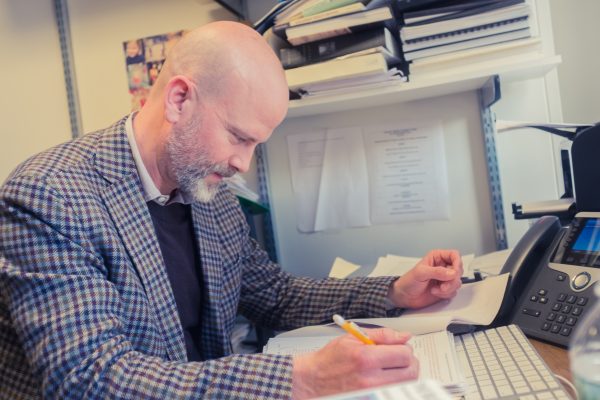Faculty and Staff Benefits to be Re-assessed in 2020
JOSE EMILIO VALCARCEL/THE OBSERVER
Former Chair of Salary and Benefits Committee Andrew Clark said that “the wage the faculty are making decreased” since the 2017 agreement.
March 27, 2019
In 2020, Fordham will re-evaluate healthcare benefits and salary allocation for faculty and staff. It will mark three years since faculty members protested against the administration’s original agreement in 2017.
The 2017 agreement reduced health care benefits and raised salaries by 2.1 percent. However, many faculty members viewed the raise as insufficient to the increased healthcare expenses and the high cost of living in New York. Though Fordham employees fought this decision in 2017, it has remained unchanged.
Since the settlement, faculty and staff have been paying for health services which were previously free. Former chair of the Faculty Salary and Benefit Committee Andrew Clark said that “all of those costs have gone up significantly, so the wage the faculty are making decreased as a result overall.”
Clark expects few changes from the 2020 re-assessment. He believes Fordham administration has displayed a pattern of undermining faculty and staff. “They think the benefits the faculty receive are too rich,” Clark said, “and that we don’t really work, we only work 12-hour weeks, and that we don’t deserve such rich benefits.” As a result, Clark stated he anticipates that administration will make the argument that “faculty want wealthy benefits for themselves at the cost of students who are starving to get scholarships.”
“Historically, the re-evaluation process has been difficult,” Haim Mozes, current Chair of the Faculty Salary & Benefits Committee, said. Both Mozes and Clark shared that there are difficulties in both communication and trust between the committee and Fordham’s administration.
Clark explained how a more comprehensive package for faculty and staff could also play a role in improving Fordham’s student and faculty retention. According to Clark, cutting benefits makes it difficult to recruit faculty who are classified as “Research I” quality. Research I institutions, also referred to as Doctoral Universities, are classified by the Carnegie Classification of Institutions of Higher Education as universities that meet lofty scholarship and research criteria. These universities attract passionate professors, provide extensive research opportunities for students outside of the classroom, and provide a wide range of majors.
Clark believes faculty and staff are also likely to become disengaged with the Fordham community, affecting retention rate and ability to establish long-term staff. The frustration of insufficient compensation for working weekends, participating on committees, etc. has had a direct effect on a faculty’s willingness to donate their extra time to students and programs.
In addition, a lack of comprehensive housing benefits has resulted in some faculty and staff being forced to live hours away from campus. Living in close proximity would allow faculty and staff to be more present on campus, which could positively impact the Fordham community.
Clark hopes that the selection of the new vice president for Human Resources, Kay Turner, could influence the administration’s decision making process. Clark describes her as an “honest and respectful negotiator,” something he admitted he had not necessarily experienced with Fordham’s administration in the past.
Mozes hopes the re-evaluation “will be done in a collaborative manner between faculty and administration.”
“If Fordham wants to continue to raise its profile, then the salary issue is always going to be a significant one,” Clark said.











